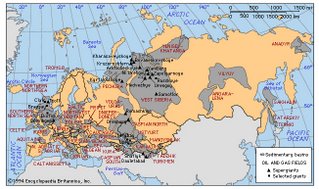Russia as an energy superpower 2 comments

(P.S: Sorry for any disturbances the advertisements above may have caused you)
Oil and gas has been THE story of the last 2-3 years and oil producers have been the prime beneficiaries of the petrodollars. We all know this industry moves in cycles; structural trends however will emerge that persist over the longer-term. In the 1970s it was the rise of an oil cartel centering on the Middle East; in the 2000s it could well be the rise of Russia as an energy superpower.
Firstly, the reserves and production capacity. Russia is the world's second largest oil exporter and has the 7th largest oil reserves. These are spread over the Caucasus in western Russia (the objective of Hitler's eastward push into Russia in 1941), and Siberian fields that would be more difficult to exploit. Russia is the top swing producer on supply crunches in the Middle East. The reserves as shown below:

Most quarters, however, see natural gas as being Russia's chief energy resource that will have the world clamouring for its favours. Natural gas, as noted in an earlier article ("Natural Gas- Alternative Energy Source"), is the most natural energy substitute for crude oil outside transportation use. Russia has about one-third of the world's gas reserves (twice that of the next largest -- Iran), and obviously is the world's largest gas producer and exporter. The whole of Europe depends on Russian natural gas for their energy and heating --- an enormous political lever that Russia tested earlier this year when it shut off supply to Ukraine and mainland Europe was also affected.

The geopolitics of Russia accentuate its strengths in oil and gas reserves. Russia is a huge country, its western end reaching into Europe and the eastern end adjoining China and Japan. It appears perfectly logical to run oil and gas pipelines to supply the demand from these huge economies. To the west, as has been mentioned, pipelines already supply gas to Europe, and Russia is targeting to export to the US east coast from its Shtokman natural gas field in Western Russia. To the east, construction has begun on the East Siberia-Pacific Ocean oil pipeline, which will run from Siberia to Russia’s Far East for export to the Asia-Pacific region, particularly China, and also Japan. In other words, Russia's energy strategy encompasses both Atlantic and Pacific facets. China has been drawing closer to Russia partially because of its need for energy security, in addition to the intent to act as counterweights to the US. A trans-Russia oil and gas pipeline would change global oil/gas transportation routes drastically, providing an intercontinental land route in addition to the sea route that passes through the Straits of Malacca from the Persian Gulf. Under such a scenario, the potential for Russia becoming an energy superpower are not limited to its own resources; its extensive land spread will mean that it will exercise great influence over any land-based oil/gas infrastructure. As it is, Russia already monopolises over the Central Asian export infrastructure.
It is also noted that the continued instability in the Middle East has boosted Russia’s position as the aspiring centre of energy geopolitics. In particular, Russia has historically exercised great influence over Iran (whom they supported in the Iran-Iraq war, for example); Iran holds the world's second largest oil reserves and also the world's second gas reserves ..... so there!
Economic nationalisation of strategic industries has been taking place especially in the oil and gas sector of major producers, such as Venezuela. The pioneer is probably Russia, and it has been ruthless. There is strong political will in consolidating the country's energy resources under the control of the state, where most gas reserves have been consolidated under Gazprom and oil reserves under Lukoil and Rosneft (formerly Yukos) --- all undoubtedly heavily state-controlled though some being floated (eg. Rosneft). While acting as a key producer independent of OPEC, global consumers are likely to see increasing leverage of Russian oil and gas as a powerful political tool.
Although there is political risk, widespread corruption and a declining Russian population, the global need for oil and supply line diversification can only mean more foreign direct investment in the country in the coming years, and with it the benefits trickling down to the masses. Russian theme plays are rare, though not non-existent on the SGX. The most important sector, however, is oil and gas, and companies supplying materials and building pipelines across Russia will do very well in the coming years. The key, ironically, is for oil/gas prices not to surge so high as to render various alternative energy projects viable.
References:
(1) Russian profile.org Jan 06: The re-emerging Russian superpower
(2) Russian profile.org Mar 06: Building a Sustainable Energy Superpower
(3) Russian profile.org Sep 06: Supply and Demand
(4) International Herald Tribune Apr 06: Russia re-energized by its natural resources
(5) Untimely Thoughts Nov 05: Russia Profile’s Weekly Experts’ Panel: Russia as an “Energy Superpower”

2 Comments:
intereasting research! I am a newbie in stock investment and have added your website to my blog.
Hi acidic sports (nice nickname!),
What's your blog address?
Post a Comment
<< Home